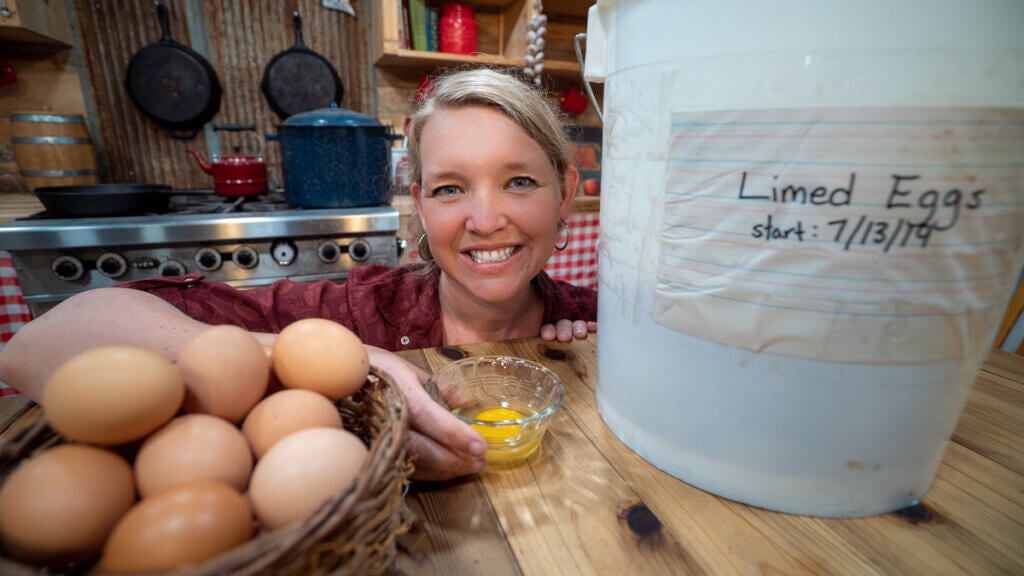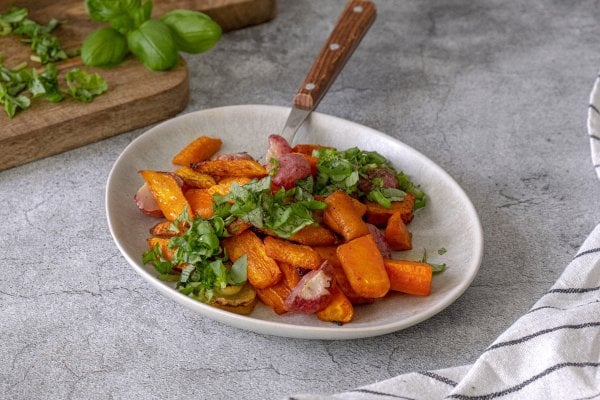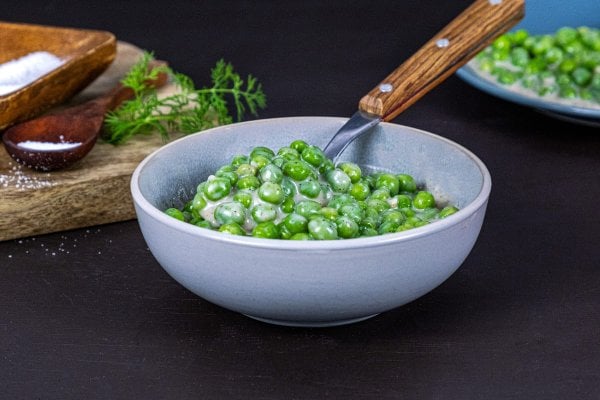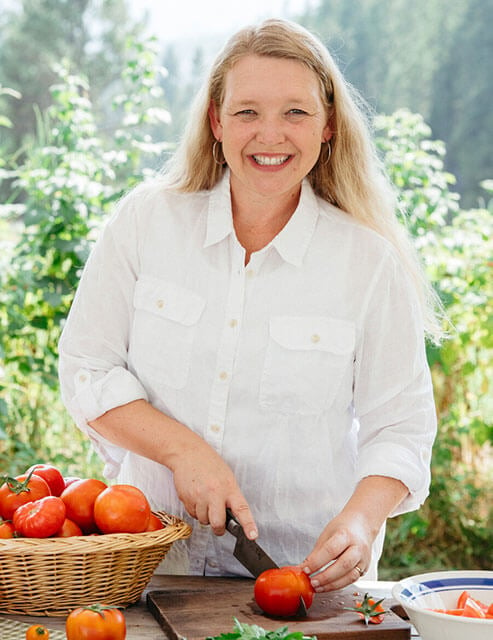Have you ever asked yourself, “Can you freeze eggs?” And can you use frozen eggs just like fresh eggs for baking or cooking later on? The answer is yes! But there are a few tips you’ll need to know first.
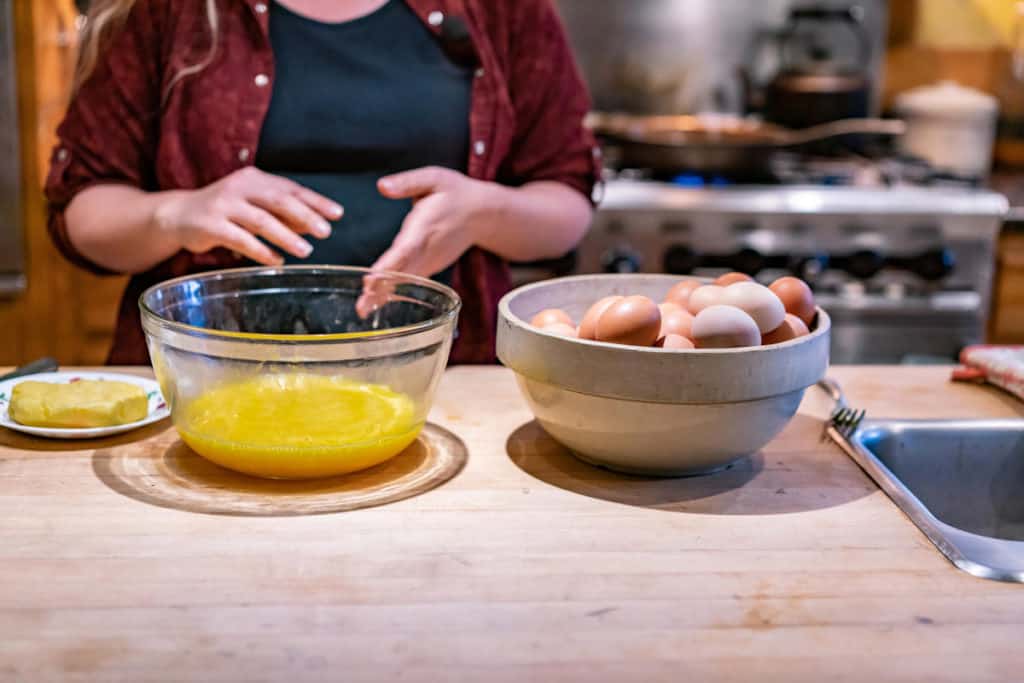
In this blog post, we’ll show you the best way to properly freeze and defrost eggs to use in breakfast casseroles, baked goods, breads and more.
Why You Should Learn How to Freeze Eggs
There are so many reasons why it’s a good idea to freeze eggs. In the springtime, as the hours of light get longer, we get inundated with so many farm-fresh eggs it’s hard to keep up with preserving them all.
We’ve shared many preservation methods for eggs, including our most popular water-glassing eggs method, closely followed by freeze dried eggs and making homemade egg noodles. But freezing eggs is also a great way to preserve an abundance of eggs and doesn’t require any special equipment (just a little extra freezer space).
Sometimes, especially during the muddy season, the nest boxes get muddy. Ideally, you want to keep your chicken coop nice and clean, we like using the deep litter method. But occasionally, the weather gets the best of you and your chickens bring in the mud with them.
Muddy eggs aren’t great for storing, and washed eggs have to be handled differently than unwashed eggs. So for those muddy eggs, freezing them is the perfect solution.
Check out all our tips for what to do with eggs when you bring them in from the hen house.
Did you know that eggs have around 17,000 pores? Washing them can invite unwanted elements into the egg. This is why washed eggs must be refrigerated, but unwashed eggs (with their protective bloom) can sit on the counter.
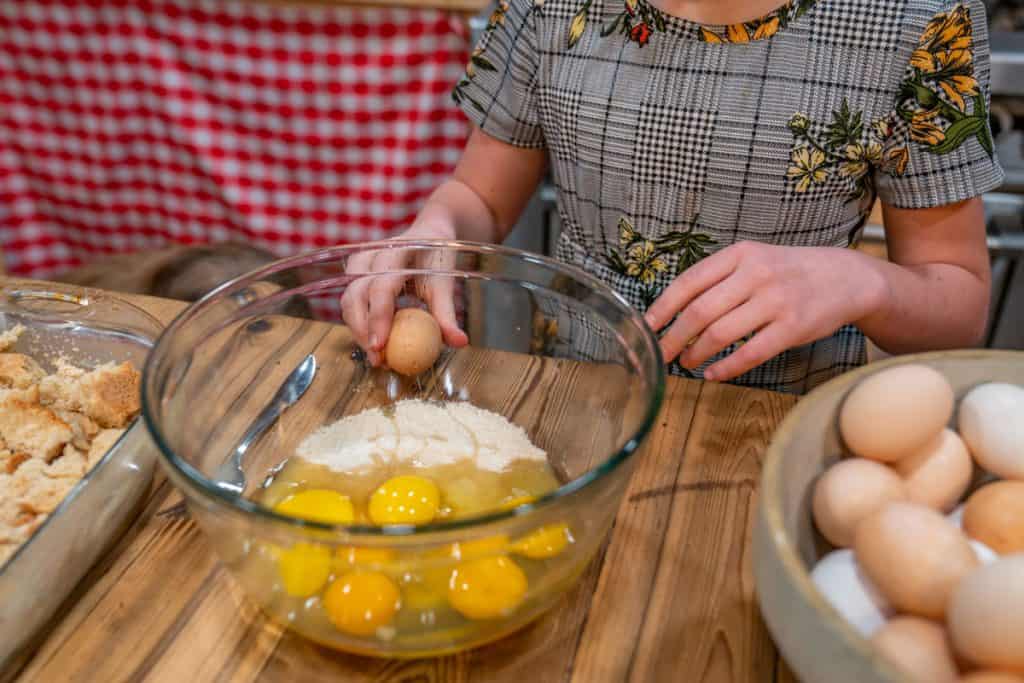
Ways to Use Frozen Eggs
Frozen eggs are incredibly versatile and can be used in various recipes, just like fresh eggs (as long as they’re properly defrosted first).
They are perfect for breakfast casseroles, baking, making muffins, and more. Though a scrambled egg made from previously frozen eggs may have some off textures, it’s still perfectly safe to cook up this way.
Previously frozen eggs are not very appetizing when fried up or poached, as they’ve already been mixed up prior to freezing. If you want to make fried or poached eggs, this is better suited to eggs that have been preserved by water-glassing.
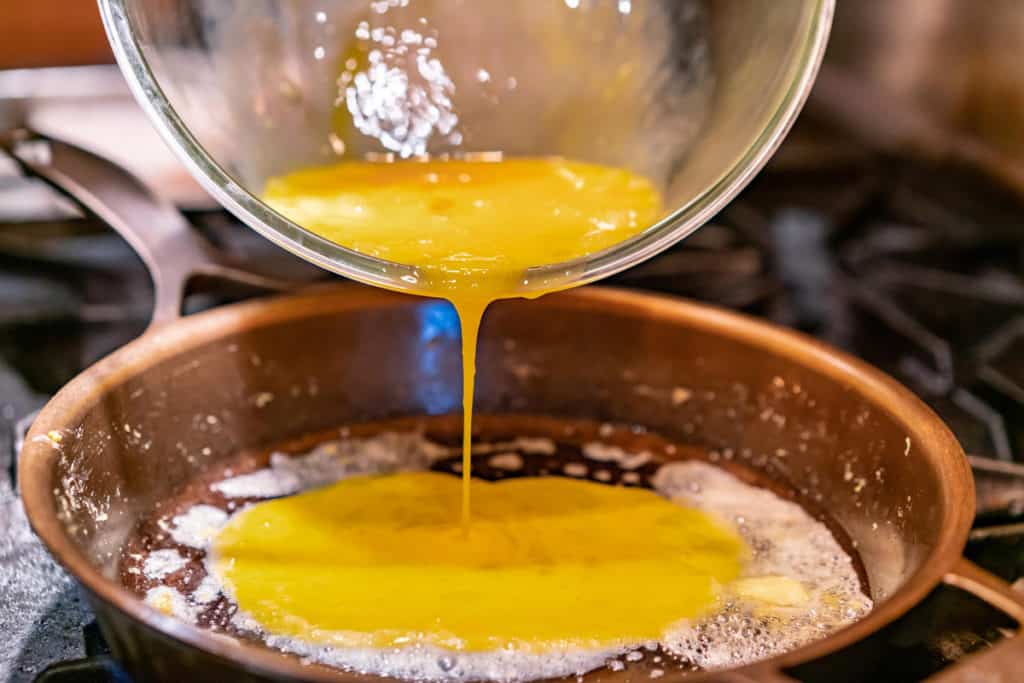
Is It Better to Freeze Raw or Cooked Eggs?
One question often asked is whether it’s better to freeze raw eggs or cooked eggs. The answer depends on your preferences and needs.
Freezing raw eggs is ideal for recipes where you need the whole egg in its raw form. Once you thaw the frozen egg, you can use it just as you would a fresh egg.
Alternatively, you can separate the yolks and the whites and freeze those separately, however the texture isn’t as desirable as the whole egg for the finished product.
Freezing cooked eggs isn’t recommended. The only time I would say this would work is if you first scramble or hard-boil the egg, then use it to make homemade freeze dried dog food.

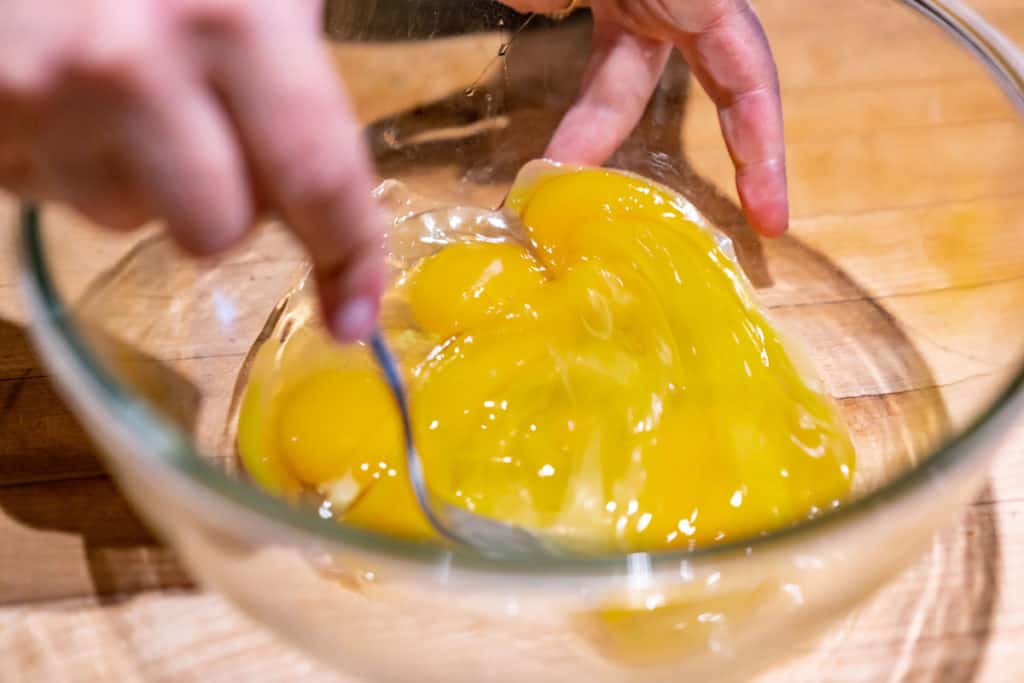
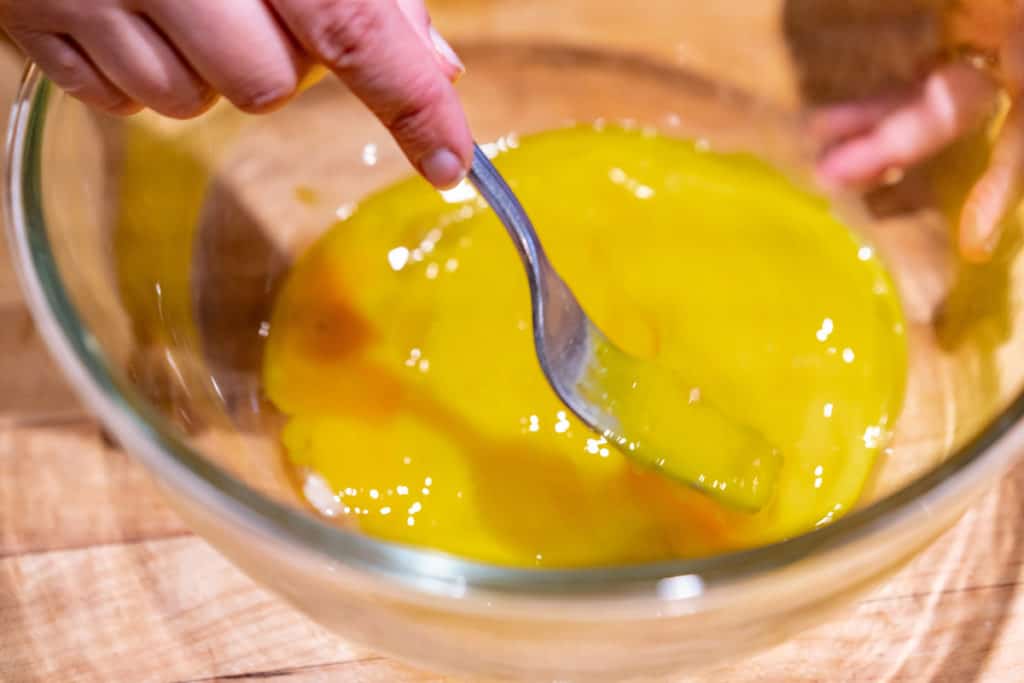
How to Freeze Eggs for Long-Term Storage
Supplies Needed
Before you begin freezing eggs, gather the necessary supplies.
- Freezer-Safe Bags or Containers –
- Ice Cube Tray (or muffin tin)
- Salt (options) – This helps preserve the texture. Mix in ⅛ teaspoon salt for every cup of eggs you plan to freeze. We use Redmond Real Salt for all our homestead needs. Use coupon code “HFSalt” at checkout for 15% off your order.
Instructions
Now, let’s get into the step-by-step process of freezing eggs for long-term storage:
- Start by cracking your fresh eggs into a bowl and gently beating them. If you prefer, you can add 1/8 teaspoon of salt per cup of eggs to help preserve their texture.
- For individual eggs, use an ice cube tray. Pour the beaten eggs into the tray’s compartments, taking note of how many cubes equal one egg. This is a helpful reference for future use.
- For larger quantities, consider a muffin pan (a silicone muffin pan works best) or a zip-top baggie (I find this works well for larger quantities as they take up less storage space).
- Fill each muffin cup or baggie with the beaten eggs, and again, keep track of how many eggs are in each container.
- Once frozen, transfer the ice-cube or muffin tin eggs to freezer-safe bags or containers, ensuring they are airtight to prevent freezer burn. For eggs frozen in zip-top baggies, place the containers flat in the freezer, similar to books on a shelf, allowing for efficient storage.
- Label the containers with details like how many eggs one baggie equals. Or “Frozen Eggs: 2 cubes = 1 egg” for easy identification. Homestead Hack: Don’t forget to label! Once those eggs have been sitting in the freezer for six months, you won’t know if they’re eggs or pumpkin puree!

Tips for Thawing Frozen Eggs
When it’s time to use your frozen eggs, it’s crucial to thaw them properly. The recommended method is to transfer the eggs to the refrigerator and let them thaw slowly.
If you’re in a hurry, place the eggs (still in their baggy) in a glass dish and submerge the dish in running cold water.
Learning how to freeze eggs is a cost-effective way to extend their shelf life and keep them readily available for your culinary endeavors.
Whether you choose to freeze raw eggs or separate yolks and whites, this method offers convenience and versatility in the kitchen. So, go ahead and master the art of freezing eggs – your cooking and baking will thank you!
Looking for great ways to use up your frozen eggs? Grab my FREE downloadable recipes for my favorite breakfast casseroles! These are recipes my family enjoys month after month, all year long. We hope you’ll enjoy them, too.
